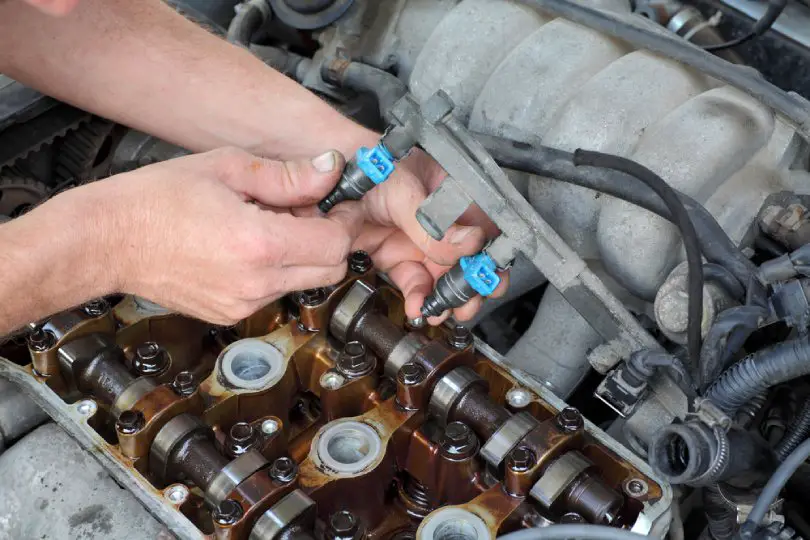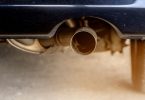“No injector pulse” refers to a situation where the fuel injectors in the engine are not receiving the electrical signal that they need to spray fuel into the cylinders. This can cause the engine to not start or to run poorly if it does start.
Fuel injectors are controlled by the engine’s computer, also known as the Engine Control Module (ECM) or the Powertrain Control Module (PCM). The computer sends electrical signals to the injectors to tell them when to spray fuel into the engine’s cylinders.
If there is a problem with the signal or the wiring leading to the injectors, the injectors may not pulse or spray fuel, leading to a “no injector pulse” condition.
This can be caused by a number of factors, including faulty wiring, a malfunctioning fuel pump or fuel pressure regulator, a damaged ECM, or clogged or damaged fuel injectors.
We’ll now look into the different possibilities so you can easily find the possible reason behind this condition and fix it promptly.
What Causes No Injector Pulse?
1. A blown fuel injector fuse
If the fuel injector itself is faulty, it will not be able to deliver fuel to the engine. This can be caused by a variety of issues, including clogged or dirty injectors, a malfunctioning solenoid, or a damaged injector.
The fuel injector fuse protects all electrical circuits and components while providing power to them. They also protect the fuel injectors, fuel pumps, and electronic circuits from a short circuit.
The system that these fuses support fails to work when they blow, which causes the shut down of the engine. As a result, no injector pulse is produced while cranking.
Normally fuses blow due to an overload or if a hot wire was being grounded somewhere. To check if a fuse is blown, remove it from the socket and examine the internal wire. If the wire is found cut then replace it with another one of the same value.
Symptoms of a blown fuel injector pulse:
- The engine misfires
- Idling gets rough
- Car won’t start
2. Bad wiring harness
The wiring harness controls the electrical functions of the vehicle. If it somehow becomes disconnected then the ECU (engine control unit) will not have a pulse reference from the distributor to fire the injectors.
Symptoms of bad wiring harness:
- The vehicle does not start when turning the ignition on.
- Specific electrical features stop working.
- Lights flicker or dim.
- Random spikes in voltage and inconsistent start-up issues.
3. A faulty fuel injector power relay
The job of a fuel injector power relay is to provide a constant electrical current flow to the fuel pump. In exchange, the fuel pump sends fuel to the injectors and the combustion chamber. The fuel pump relay is also in charge of assisting your vehicle to start.
Carbon buildup caused by low-quality fuel is one of the most common reasons behind the fuel injector failure. Fuel spraying into the cylinders becomes difficult due to carbon buildup.
Using a high-quality fuel system cleaner can solve this problem or you can also try a new fuel injector power relay.
Symptoms of a faulty fuel injector power relay:
- Long starting time
- Performance loss
- Sputtering and engine misfire
4. Unmatched Resistance Value
If the highest and the lowest resistance values of the two terminals of each injector are beyond the limits stated on the injector datasheet then there will be no injector pulse.
In case you didn’t know, the low impedance injectors resistance value is around 1.8-3.0 ohms while the high impedance injectors resistance value is around 11-15 ohms.
5. Bad Engine Computer
A bad engine computer can cause no injector pulse even if you have fuel pressure and spark. The reason behind this is the failure of the computer’s injector driver circuit, which controls the fuel injection system.
Effects of No Injector Pulse
Injectors are electronically controlled valves specialized for supplying fuel to cars. They directly affect the performance of the engine.
If there is no injector pulse, the fuel injectors in the engine will not receive the electrical signal they need to spray fuel into the engine’s cylinders. This can cause several issues, including:
a) Engine not starting: If the fuel injectors do not pulse, the engine may not start at all, or it may start and then quickly stall out.
b) Poor engine performance: If the fuel injectors are not delivering fuel to the engine’s cylinders, the engine will not run properly. This can result in poor acceleration, reduced power, misfires, and other performance issues.
c) Reduced fuel efficiency: A no injector pulse condition can also result in reduced fuel efficiency, as the engine is not receiving the proper amount of fuel to operate efficiently.
d) Check engine light: If the engine’s computer detects a no injector pulse condition, it will likely trigger the check engine light on the dashboard to alert the driver that there is a problem.










Leave a Comment